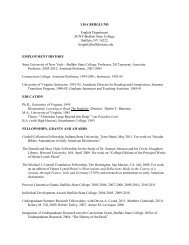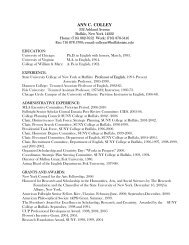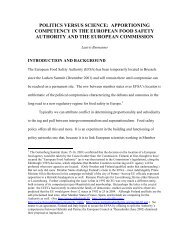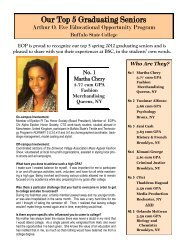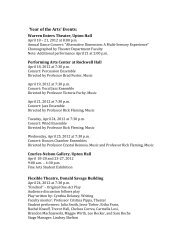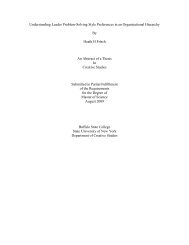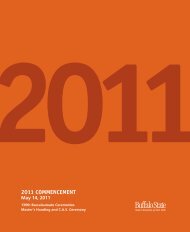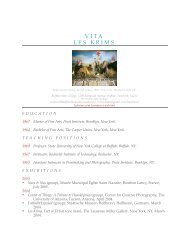Arts - Buffalo State College
Arts - Buffalo State College
Arts - Buffalo State College
You also want an ePaper? Increase the reach of your titles
YUMPU automatically turns print PDFs into web optimized ePapers that Google loves.
whether the US Defense of Marriage Act (DOMA) and state DOMAS<br />
are unconstitutional by unfairly denying same-sex couples their<br />
fundamental rights as American citizens.<br />
Presentation Type and Session: Poster V<br />
Exploring a Possible <strong>College</strong> Drinking<br />
Motive: Defiance<br />
James Harter, Psychology<br />
Faculty Mentor: Professor Michael MacLean, Psychology<br />
Drinking is associated with numerous problems and negative<br />
consequences for college students. When it comes to college<br />
drinking, there are four motives that are typically studied in the<br />
field of psychology: coping with negative emotions, enhancement<br />
of positive emotions, enhancement of socializing, and conformity.<br />
The purpose of this study was to propose a possible new motive<br />
known as defiance drinking. Defiance drinking is drinking because<br />
it is forbidden and one wishes to defy parental and/or societal<br />
restrictions, perhaps as a way of demonstrating autonomy and<br />
independence. The study comprised of 291 participants, (138<br />
potential participants were removed because they were over 21 years<br />
of age or because of validity issues and another 108 participants<br />
were excluded due to not reporting alcohol consumption in the last<br />
month). Confirmatory factor analysis and meditational analysis were<br />
conducted to test whether defiance drinking motives were adequately<br />
measured and whether they are significantly associated with alcohol<br />
outcomes. The results indicate that defiance drinking motives<br />
partially mediate the relationship between deviance-proneness and<br />
alcohol outcomes. This suggests that defying authority is a motive<br />
for some underage college drinkers and that it is tied to a tendency<br />
to break rules and to experience alcohol-related problems. Defiance<br />
drinking motives appear to be worthy of additional study.<br />
Presentation Type and Session: Poster IV<br />
Eye Tracker and Art Perception<br />
Victoria Bitterman and Kathryn Przybysz, PSY 488:<br />
Internship<br />
Faculty Mentors: Professor Howard Reid, Psychology, Professor Lin<br />
Xia Jiang, Fine <strong>Arts</strong>, and Professor Stephani Foraker, Psychology<br />
Our study is using an eye tracker apparatus to examine whether<br />
or not there is a difference in perception of pictures between novice<br />
and trained artists. Previous eye tracker research has examined<br />
complex art issues, such as whether novices and trained artists<br />
view abstract paintings differently. There is no previous research<br />
comparing the variables we are examining. Specifically we are using<br />
an eye tracker apparatus to record the eye movements of students<br />
in art classes and non-art classes while looking at relatively simple<br />
drawings. These black and white drawings consist of objects, faces,<br />
and human figures. The drawings will be shown in pairs, with one<br />
correctly drawn and one that is identical except for a minor error in<br />
perspective or proportion. We will be measuring the amount of time<br />
Psychology and Social Sciences<br />
spent focusing on the errors. Our prediction is that the amount of<br />
time that subjects focus on the errors will increase with the amount<br />
of art training they have received.<br />
Presentation Type and Session: Poster II<br />
Fair Trade and Organic Consumption:<br />
African-American Students’ Attitudes<br />
Toward Food Choices<br />
Ariel Peters, PSC 470W: Senior Seminar<br />
Faculty Mentors: Professor Patrick McGovern, Political Science<br />
and Professor Kyeonghi Baek, Political Science<br />
There has been an abundance of research done about the<br />
psychological traits of fair trade and organic consumers and the<br />
emerging trend of political consumerism. However, little research<br />
has been done exploring African-American attitudes toward<br />
purchasing organic products. Of those studied, people who identified<br />
themselves as purchasers of fair trade and organic products were<br />
often motivated to purchase because of social pressure, beliefs about<br />
social justice, perceived health benefits, price and availability. My<br />
research will examine a relationship between African-American<br />
consumers and their attitudes toward organic and fair trade<br />
products. I hypothesize that African-American consumers perceive<br />
organic and fair trade food products differently from their white<br />
counterparts. This would fall into line with theories suggesting<br />
that African-American consumers may be acculturated toward<br />
food differently from white consumers. Using random sampling<br />
techniques, I will complete an analysis of survey data collected from<br />
<strong>Buffalo</strong> <strong>State</strong> <strong>College</strong> students regarding their food preferences and<br />
purchasing habits. Conclusions from this study may then be used to<br />
assess consumer behavior towards these products with regard not<br />
only to price and availability but group attitudes as well.<br />
Presentation Type and Session: Poster V<br />
Friendship Qualities, Academic Interest,<br />
and Academic Performance In <strong>College</strong><br />
Geraldine Erokwu, Psychology<br />
Faculty Mentor: Professor Michael MacLean, Psychology<br />
When it comes to factors that influence academic performance<br />
there is more research on secondary students than college students.<br />
The purpose of this project is to study the relationships among<br />
friendship qualities, academic interest, and academic performance.<br />
For the purpose of this study academic interest is defined as what<br />
motivates students internally to engage in schoolwork and succeed.<br />
Using the Friendship Quality Scale and a modification of Marsh<br />
et al.’s (2005) measure to assess academic interest, data will be<br />
gathered from <strong>Buffalo</strong> <strong>State</strong> <strong>College</strong> students. I hypothesize that<br />
there will be an interaction, such that the influence of academic<br />
influence will vary depending on friendship qualities. With the results<br />
of this study, I hope to contribute to the field and help colleges serve<br />
students better.<br />
Presentation Type and Session: Poster IV<br />
115




